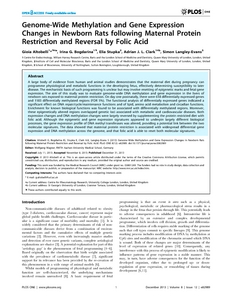Altobelli, G; Bogdarina, IG; Stupka, E; Clark, AJ; Langley-Evans, S
(2013)
Genome-Wide Methylation and Gene Expression Changes in Newborn Rats following Maternal Protein Restriction and Reversal by Folic Acid.
PLoS ONE, 8 (12).
e82989 -e82989 (11).
ISSN 1932-6203
https://doi.org/10.1371/journal.pone.0082989
SGUL Authors: Clark, Adrian John L
![[img]](https://openaccess.sgul.ac.uk/104365/1.hassmallThumbnailVersion/pone.0082989.pdf)  Preview |
|
["document_typename_application/pdf; charset=binary" not defined]
Published Version
Download (1MB)
| Preview
|
Abstract
A large body of evidence from human and animal studies demonstrates that the maternal diet during pregnancy can programme physiological and metabolic functions in the developing fetus, effectively determining susceptibility to later disease. The mechanistic basis of such programming is unclear but may involve resetting of epigenetic marks and fetal gene expression. The aim of this study was to evaluate genome-wide DNA methylation and gene expression in the livers of newborn rats exposed to maternal protein restriction. On day one postnatally, there were 618 differentially expressed genes and 1183 differentially methylated regions (FDR 5%). The functional analysis of differentially expressed genes indicated a significant effect on DNA repair/cycle/maintenance functions and of lipid, amino acid metabolism and circadian functions. Enrichment for known biological functions was found to be associated with differentially methylated regions. Moreover, these epigenetically altered regions overlapped genetic loci associated with metabolic and cardiovascular diseases. Both expression changes and DNA methylation changes were largely reversed by supplementing the protein restricted diet with folic acid. Although the epigenetic and gene expression signatures appeared to underpin largely different biological processes, the gene expression profile of DNA methyl transferases was altered, providing a potential link between the two molecular signatures. The data showed that maternal protein restriction is associated with widespread differential gene expression and DNA methylation across the genome, and that folic acid is able to reset both molecular signatures.
Statistics
Item downloaded times since 25 Mar 2014.
Actions (login required)
 |
Edit Item |




